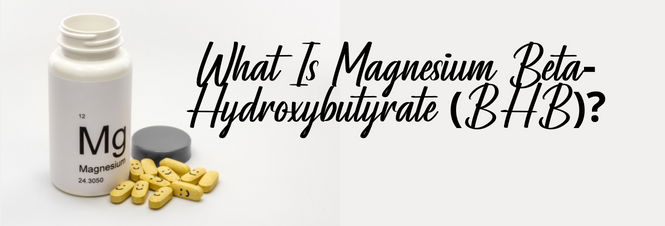What Is Magnesium Beta-Hydroxybutyrate (BHB) For?

Have you ever heard anything about magnesium beta-hydroxybutyrate? Do you know what the benefits of magnesium for our bodies are? If not, probably this article is precisely for you!
Beta-hydroxybutyrate (BHB) is a dietary supplement component that has been self-certified as Generally Recognized as Safe (GRAS). BHB raw material is usually given as a stable mineral salt, such as BHB sodium, BHB calcium, BHB magnesium, or BHB potassium.
BHB magnesium provides several advantages for our bodies. It might aid keto diets in overcoming the “keto flu.” This salt may also help with weight reduction by suppressing hunger. It may help with memory by reducing inflammation and oxidative stress.
Let’s see what you should know about magnesium beta-hydroxybutyrate and how to import it into your daily life.
TABLE OF CONTENTS:
- What Is Magnesium Beta-hydroxybutyrate?
- What Are Ketones and Ketosis?
- Benefits of Magnesium Beta-Hydroxybutyrate
- Is Magnesium Beta-Hydroxybutyrate Safe?
- Side Effects of Magnesium Beta-Hydroxybutyrate
- Does Magnesium Help with Weight Loss?
- Magnesium Has the Potential to Improve Glucose Metabolism
- Magnesium May Aid in Stress Reduction and Sleep Quality
- Magnesium Supplementation May Increase Exercise-Related Cellular Energy
- Magnesium Plays an Essential Role in Muscle Contraction
- Magnesium May Help Boost Athletic Performance
- Magnesium Can Aid in the Maintenance of a Healthy Heartbeat
- Magnesium May Help Fight Inflammation Within the Body
- Magnesium May Perform as a Natural Mood Booster
What Is Magnesium Beta-hydroxybutyrate?
Magnesium Beta-hydroxybutyrate (also known as Mg-hydroxybutyrate, or Mg-BHB) is a ketone body that your liver produces from fatty acids. Let’s imagine your glucose supply is insufficient to meet your body’s energetic demands. In that case, Magnesium BHB might be an essential transporter of energy from your liver to your peripheral tissues.
For example, suppose you are participating in an extended activity, prolonged fasting, or lack dietary carbs for any reason. In that case, your liver will release ketones to assist you in getting through the energy drought.
More than 80% of your body’s stored energy is now kept in the fatty acids in adipose tissue. Fasting depletes the glycogen stores in your muscles and liver. Therefore, adipocytes store fat and send it to the liver to be broken down into ketones. Following that, your blood transports your ketone bodies to metabolically active tissue in your muscles or brain. As a result of their transformation into ATP, they serve as a source of power for your body.
What Are Ketones and Ketosis?
However, distinguishing between the many ketones available may be difficult. So, let us go further into the term “ketone.” A ketone (or ketoacid) is an alternate fuel for your body that is produced when glucose levels are low. When your liver breaks down fat, it produces ketones.
These intervals, whether sleeping or fasting for another reason, might produce a drop in your insulin levels. In the meanwhile, your epinephrine and glucagon levels are normal. Low insulin levels and standard epinephrine and glucagon levels enable fat to be released from fat cells and travel via your blood to your liver. There it may be converted into ketone units.
Once converted, they flow via your blood to your muscle and other tissues, where they may assist fuel your metabolism.
Then, knowing all these things, we must answer what ketosis is. When you fast (intermittently), you induce ketosis, which means we have increased levels of ketones in the blood.
Benefits of Magnesium Beta-Hydroxybutyrate
The initial substrate that triggers the metabolic state of ketosis is beta-hydroxybutyrate. One of the most essential salts for our bodies is Magnesium Beta-Hydroxybutyrate with its benefits.
Returning to the previous example, whether you take additional forms or your body produces beta-hydroxybutyrate, magnesium BHB may be metabolized in your body. That results in a lot of clean energy.
Magnesium beta-hydroxybutyrate floats about in your circulation and, more crucially, can overcome various barriers to conversion into energy at any moment. The brain is one of the most critical places where this occurs. Because magnesium BHB is such a rock star and so hydrophilic, your brain learns to let it in so it may contribute energy to the party at any moment. This is one of the primary reasons why increasing ketosis levels results in enhanced brain clarity, attention, and a decrease in neurodegenerative disorders.
The conversion of magnesium beta-hydroxybutyrate to energy is a straightforward process. As previously said, magnesium BHB ultimately leads to energy generation after consumption or when your body breaks down stored body fat. It does this by entering the cell and entering the mitochondria (energy factories), where it cleaves the carboxyl acid group and transforms into acetoacetate (another “ketone body”).
Acetoacetate is converted to acetoacetyl-CoA, which is subsequently broken down into acetone (another “ketone body”) and acetyl-CoA. Acetyl-CoA is the primary reason we seek BHB in the first place. This enters the Krebs cycle and is converted into ATP – the energy currency of your cells!
That’s all there is to it. Magnesium BHB is significant because it can easily float throughout your body in your blood. Also, it reaches numerous tissues that other molecules cannot before converting into energy.
Is Magnesium Beta-Hydroxybutyrate Safe?
That is not a tricky question because much research shows magnesium beta-hydroxybutyrate is safe. Both generate magnesium BHB in your liver, and supplementing with magnesium beta-hydroxybutyrate is safe. As previously stated, blood levels ranging from 0.5 to 3.0 mmol are typical. Some individuals get anxious when they hear “diabetic ketoacidosis,” or DKA, a completely distinct metabolic situation in which your BHB levels surge to 15-25 mmol blood readings.
Diabetic ketoacidosis will not occur if you have a normal pancreas and are not diabetic. This should not be a problem if you generate any insulin at all.
Side Effects of Magnesium Beta-Hydroxybutyrate
One of the typical side effects of your body producing magnesium beta-hydroxybutyrate is the halt in time required to transition from carbohydrate metabolism to fat metabolism. It may take 3-4 days. This might result in mood fluctuations, weariness, and overall exhaustion. I advocate using exogenous magnesium BHBs to flip your body over quickly if you wish to bypass that stage.
Slight gastrointestinal upset is one of the adverse effects of taking too much supplementary magnesium BHB. Simply put, your body isn’t accustomed to dealing with all these ketones. If this is an issue, just stair-step the quantity you take until tolerance is reached.
Does Magnesium Help with Weight Loss?
First, let’s summarize what we know about this element. Magnesium is a mineral that your body must have to operate correctly. As one of the five essential electrolytes, magnesium is necessary for the nucleus of all living organisms. Cells require magnesium to create energy, manufacture enzymes, and activate hundreds of chemical events inside a live organism.
Magnesium is necessary for muscle contraction and function in the human body. The interaction of magnesium and phosphate aids in the transit of calcium and potassium, allowing the heart muscle to maintain a steady rhythm. Magnesium also affects blood sugar management, renal filtration mechanisms, and neurotransmitters that regulate neurons. As one of the five essential electrolytes, magnesium may aid calcium absorption, strengthening your teeth and bones.
Even with this broad spectrum of potential advantages, most individuals want to learn more before adding another pill or supplement like magnesium BHB to their routine. A look at the top reasons to consider taking magnesium for weight reduction might help you make an educated fitness choice.
Magnesium Has the Potential to Improve Glucose Metabolism
Magnesium’s function in blood sugar management may aid in the improvement of glucose parameters in those who are overweight or at risk of developing diabetes. A 2016 research published in the European Journal of Clinical Nutrition discovered magnesium helped regulate glucose levels in insulin-resistant subjects. Participants who took oral magnesium BHB exhibited higher insulin sensitivity for weight reduction, lower plasma glucose levels, and reduced bloating and water retention. The decrease in bloating was significant enough that researchers proposed magnesium as a viable treatment for premenstrual syndrome symptoms (PMS). It is vital to emphasize that participants also reduced calories and exercised regularly to lose weight.
Magnesium May Aid in Stress Reduction and Sleep Quality
According to research, magnesium BHB may help alleviate stress and anxiety and improve sleep quality. Stress and a lack of sleep have been linked by researchers to the production of cortisol. This stress hormone also causes the body to accumulate extra fat. According to 2017 research, magnesium may help lower subjective anxiety symptoms such as elevated cortisol levels. The study also stated that more research might validate the benefits of utilizing magnesium beta-hydroxybutyrate for weight reduction.
Magnesium Supplementation May Increase Exercise-Related Cellular Energy
Suppose your weight-loss plan involves high-intensity activities that demand a lot of sweat and energy. In such circumstances, electrolytes will be necessary to repair and recover your cells. Magnesium is one of the five electrolytes that your body needs (along with calcium, sodium, chloride, potassium, and phosphate). This mineral, in particular, is an essential co-factor in creating ATP, the coenzyme required to carry energy inside and between cells. Magnesium acts as a cellular “battery” with ATP to convert energy from meals and control cell respiration. This technique may assist you in expending energy during endurance activities, resulting in fat reduction.
Magnesium Plays an Essential Role in Muscle Contraction
Many dietitians and exercise physiologists advocate increasing lean muscle if you want to lose weight. This procedure usually requires both aerobic exercise and weight training. Magnesium is necessary for muscular contraction and relaxation during activity. This mineral acts as a calcium blocker in the body, allowing muscles to relax.
Calcium interacts with the fibrous proteins troponin C and myosin to cause contraction. Magnesium counteracts this process by binding to enough proteins to promote relaxation. Over-contraction without relaxation may result in spasms, twitching, discomfort, or cramps if you do not have enough magnesium in your system. Magnesium BHB for weight reduction may help muscle repair and lessen post-exercise pain.
Magnesium May Help Boost Athletic Performance
Besides having an essential function in muscular contraction, magnesium beta-hydroxybutyrate may improve overall exercise performance. First, studies have shown that the body requires up to 20% more magnesium during activity than rest. Magnesium, in particular, aids in the reduction of lactic acid accumulation in muscles after exercise. Because an overabundance of lactic acid may cause discomfort and muscular exhaustion, magnesium beta-hydroxybutyrate may help improve exercise efficacy and reduce weight.
In addition to transporting lactic acid, magnesium transports blood sugar into circulation for energy during exercise. It enhances the availability of oxygen to working muscles. A 2014 research published in the Journal of Sports Sciences discovered that professional volleyball players who took a daily magnesium BHB of 250 milligrams enhanced their leaping ranges and arm motions.
In another study, triathletes who took magnesium supplements for four weeks improved in cycling, swimming, and long-distance running. Furthermore, these athletes had reduced levels of insulin resistance and the stress hormone cortisol. If you want to increase the effectiveness of your exercise, utilizing magnesium for weight reduction may be a simple method to make it worthwhile.
Magnesium Can Aid in the Maintenance of a Healthy Heartbeat
Weight reduction plans and regular physical exercise need that the body maintains the heart’s electrical activity at a steady level. Because the heart is a muscle, magnesium is essential for its contraction and relaxation. Heartbeats and blood pressure rely heavily on the body’s primary electrolytes (magnesium, calcium, sodium, chloride, potassium, and phosphate). When calcium comes into touch with heart muscle cells, it binds to proteins, causing the heart muscle to contract.
Magnesium promotes equilibrium by attaching to proteins and relaxing the heart muscle. The proper quantity of magnesium also aids in regulating the body’s sodium-potassium pump, which is responsible for muscle impulse control. Having adequate magnesium in your system may assist reduce atrial arrhythmias, palpitations, and spasms during weight loss activity. Muscle contraction and relaxation may also reduce the risk of atherosclerosis, a hardened accumulation of plaque and fat on the inside walls of arteries.
Similarly, magnesium BHB may assist patients at risk of hypertension in maintaining appropriate blood pressure. The mineral relaxes blood arteries, preventing overstimulation, which may lead to significant health concerns. A 2009 research published in the Journal of Human Hypertension discovered that taking a 450-milligram magnesium supplement daily substantially reduced systolic and diastolic blood pressure levels. Because of the correlation between obesity and cardiovascular disease, reducing excess fat with magnesium BHB is a low-effort strategy to improve heart health.
Magnesium May Help Fight Inflammation Within the Body
Magnesium may also help the body get rid of inflammation. Chronic inflammation is one of the main reasons why people gain weight. It affects the body’s natural system for controlling hunger and slows down hormones that control the metabolism. Inflammation of the cells can also cause insulin resistance, metabolic syndrome, and the body to hold on to water weight. A 2014 study found that individuals who consumed the least magnesium had the highest CRP, blood sugar, triglyceride, and cholesterol levels.
Fortunately, the same research discovered that daily taking magnesium BHB might lower the level of the inflammatory marker CRP as well as the risk of syndrome X and prediabetes. The correct quantity of magnesium also triggered fatty acid production, suggesting that it may also assist in maintaining a desirable weight and body mass index (BMI).
Because magnesium is a natural electrolyte that balances excess sodium, it may help to minimize the fluid retention linked with inflammation and excess water weight. Taking magnesium beta-hydroxybutyrate for weight reduction may be a fantastic approach to reducing the consequences of chronic inflammation in cells. That is because it is naturally anti-inflammatory and may enhance lipid profiles.
Magnesium May Perform as a Natural Mood Booster
Dedication to a weight reduction and fitness program often requires inspiration and the right mentality. According to ongoing studies, magnesium BHB may help to improve mood and reduce the risk of apathy and depression.
Researchers have discovered that magnesium decreases anxiety and the production of the stress hormone cortisol. Furthermore, significant research published in 2015 by the American Board of Family Medicine found that persons lacking magnesium had a 22% increased risk of depression.
According to another study, magnesium supplementation may help lessen depressive symptoms and improve mood. For example, research published in Medical Hypotheses found that persons who took 450 mg of magnesium daily improved their moods and those who took prescription antidepressants. Modern diets lack magnesium, so taking magnesium BHB for weight loss may offer you the mood boost you need to exercise.
Last Words
Every cell in your body needs magnesium! Your heart, liver, kidneys, and bones are all affected. Getting enough magnesium is critical for optimal health. So consume lots of magnesium-rich foods or take supplements like magnesium BHB if you don’t receive enough from your diet alone.
Without enough of this vital mineral, your body cannot operate properly. Magnesium beta-hydroxybutyrate aids in weight management by regulating blood sugar and insulin levels. Remember the next time you need a mid-afternoon snack: choose something magnesium-rich. It will provide numerous health benefits and boost your weight loss efforts!
References:
- Hruby, A., Ngwa, J. S., Renström, F., Wojczynski, M. K., Ganna, A., Hallmans, G., Houston, D. K., Jacques, P. F., Kanoni, S., Lehtimäki, T., Lemaitre, R. N., Manichaikul, A., North, K. E., Ntalla, I., Sonestedt, E., Tanaka, T., van Rooij, F. J., Bandinelli, S., Djoussé, L., Grigoriou, E., … Nettleton, J. A. (2013). Higher magnesium intake is associated with lower fasting glucose and insulin, with no evidence of interaction with select genetic loci, in a meta-analysis of 15 CHARGE Consortium Studies. The Journal of nutrition, 143(3), 345–353. https://doi.org/10.3945/jn.112.172049
- Swaminathan R. (2003). Magnesium metabolism and its disorders. The Clinical biochemist. Reviews, 24(2), 47–66.
- Eby, G. A., & Eby, K. L. (2006). Rapid recovery from major depression using magnesium treatment. Medical hypotheses, 67(2), 362–370. https://doi.org/10.1016/j.mehy.2006.01.047
- Tarleton, E. K., & Littenberg, B. (2015). Magnesium intake and depression in adults. Journal of the American Board of Family Medicine : JABFM, 28(2), 249–256. https://doi.org/10.3122/jabfm.2015.02.140176
- Nielsen F. H. (2014). Effects of magnesium depletion on inflammation in chronic disease. Current opinion in clinical nutrition and metabolic care, 17(6), 525–530. https://doi.org/10.1097/MCO.0000000000000093
- Guerrero-Romero, F., & Rodríguez-Morán, M. (2009). The effect of lowering blood pressure by magnesium supplementation in diabetic hypertensive adults with low serum magnesium levels: a randomized, double-blind, placebo-controlled clinical trial. Journal of human hypertension, 23(4), 245–251. https://doi.org/10.1038/jhh.2008.129
- Iseri, L. T., & French, J. H. (1984). Magnesium: nature’s physiologic calcium blocker. American heart journal, 108(1), 188–193. https://doi.org/10.1016/0002-8703(84)90572-6
- Nielsen, F. H., & Lukaski, H. C. (2006). Update on the relationship between magnesium and exercise. Magnesium research, 19(3), 180–189.
- de Baaij, J. H., Hoenderop, J. G., & Bindels, R. J. (2015). Magnesium in man: implications for health and disease. Physiological reviews, 95(1), 1–46. https://doi.org/10.1152/physrev.00012.2014
- Jahnen-Dechent, W., & Ketteler, M. (2012). Magnesium basics. Clinical kidney journal, 5(Suppl 1), i3–i14. https://doi.org/10.1093/ndtplus/sfr163
- Boyle, N. B., Lawton, C., & Dye, L. (2017). The Effects of Magnesium Supplementation on Subjective Anxiety and Stress-A Systematic Review. Nutrients, 9(5), 429. https://doi.org/10.3390/nu9050429
- Veronese, N., Watutantrige-Fernando, S., Luchini, C., Solmi, M., Sartore, G., Sergi, G., Manzato, E., Barbagallo, M., Maggi, S., & Stubbs, B. (2016). Effect of magnesium supplementation on glucose metabolism in people with or at risk of diabetes: a systematic review and meta-analysis of double-blind randomized controlled trials. European journal of clinical nutrition, 70(12), 1354–1359. https://doi.org/10.1038/ejcn.2016.154
- Boomsma D. (2008). The magic of magnesium. International journal of pharmaceutical compounding, 12(4), 306–309.
- Rumawas, M. E., McKeown, N. M., Rogers, G., Meigs, J. B., Wilson, P. W., & Jacques, P. F. (2006). Magnesium intake is related to improved insulin homeostasis in the framingham offspring cohort. Journal of the American College of Nutrition, 25(6), 486–492. https://doi.org/10.1080/07315724.2006.10719563
- Durlach, J., Pagès, N., Bac, P., Bara, M., & Guiet-Bara, A. (2002). Biorhythms and possible central regulation of magnesium status, phototherapy, darkness therapy and chronopathological forms of magnesium depletion. Magnesium research, 15(1-2), 49–66.
- Poleszak E. (2008). Benzodiazepine/GABA(A) receptors are involved in magnesium-induced anxiolytic-like behavior in mice. Pharmacological reports : PR, 60(4), 483–489.
- Abbasi, B., Kimiagar, M., Sadeghniiat, K., Shirazi, M. M., Hedayati, M., & Rashidkhani, B. (2012). The effect of magnesium supplementation on primary insomnia in elderly: A double-blind placebo-controlled clinical trial. Journal of research in medical sciences : the official journal of Isfahan University of Medical Sciences, 17(12), 1161–1169.
- Stefan, M., Sharp, M., Gheith, R., Lowery, R., & Wilson, J. (2021). The Effect of Exogenous Beta-Hydroxybutyrate Salt Supplementation on Metrics of Safety and Health in Adolescents. Nutrients, 13(3), 854. https://doi.org/10.3390/nu13030854
- Newman, J. C., & Verdin, E. (2017). β-Hydroxybutyrate: A Signaling Metabolite. Annual review of nutrition, 37, 51–76. https://doi.org/10.1146/annurev-nutr-071816-064916







